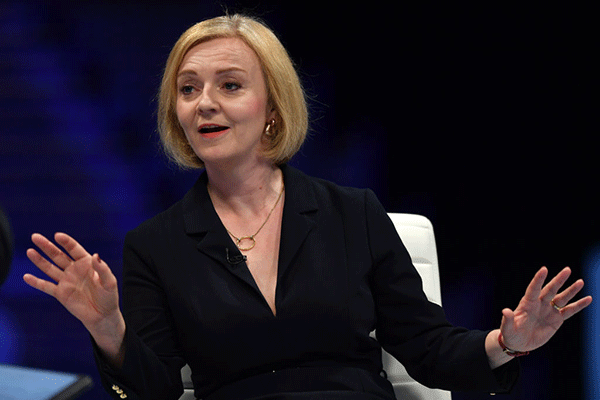PM Liz Truss triggers buying of these popular shares
6th September 2022 13:40
by Graeme Evans from interactive investor
As the new prime minister begins devising her plan for the UK economy, City analysts are guessing that likely new policies could be very good news for certain stocks.

Liz Truss’s first day in office brought respite for retail investors today as widely held Marks & Spencer Group (LSE:MKS), Next (LSE:NXT) and Dunelm Group (LSE:DNLM) rallied on hopes of support for Britain’s squeezed households.
Their share price gains were slender in the context of this year’s slide, but welcome all the same, as City analysts revised their worst-case expectations on speculation that the new prime minister will this week announce a freeze in bills for homes and businesses.
Such an intervention comes at a huge long-term cost potentially topping £100 billion and is unlikely to stave off recession, but it may limit the depth and length of the downturn.
- Read about how to: Open a Trading Account | How to start Trading Stocks | Top UK shares
Those hopes were reflected on the FTSE 100 index risers board, which was peppered today with stocks focused on the UK economy. They included Lloyds Banking Group (LSE:LLOY), which added 2p to 45.4p as investors revised their outlook for bad debts and Jefferies analysts upgraded their price target to 83p on hopes that Truss will pursue a pro-growth agenda.
In the FTSE 250 index, food-on-the-go operators Domino's Pizza Group (LSE:DOM) and Greggs (LSE:GRG) rebounded to where they were in mid-August, and pubs chains Mitchells & Butlers (LSE:MAB) and JD Wetherspoon (LSE:JDW) rose sharply on hopes of support with surging energy costs.
The average utility bill for households is currently capped at £1,971 but this is due to rise by 80% in October with the likelihood of more big increases in January and April.
- Daily Trading Flash: 10 most-traded shares 6 September 2022
- Jeremy Grantham: ‘Prepare for an epic finale of the superbubble’
- Stockwatch: are these dividend shares worth buying as a play on tax cuts?
UBS warned: “Without intervention to help households and businesses with soaring energy costs the UK economy is likely heading for a sharp contraction in the fourth quarter. Consumption, production, and investment are all likely to fall.”
The support planned by Truss is set to focus on providing energy companies with state-backed commercial loans, which could then be clawed back over many years.
Capital Economics thinks a freeze in the price cap will mean inflation peaks at around 11% in October this year, rather than 14.5% in January as currently forecast and that the peak-to-trough fall in real GDP may be more like 0.5% than 1%.
Shearing also sees next year’s previously anticipated 3% fall in real household disposable incomes being reduced to up to 0.5%.
The projections and potential help on business energy costs underpinned the shares of leading retailers today, with Marks & Spencer moving off its recent two-year low of 120p to stand at 129.15p and Next improving 224p to 6260p.
Despite the potential energy subsidies, analysts at Jefferies today removed their “buy” recommendations on Primark business Associated British Foods (LSE:ABF), B&Q owner Kingfisher (LSE:KGF) and the supermarkets J Sainsbury (LSE:SBRY)’s and Tesco (LSE:TSCO). The quartet are now on hold, alongside Marks & Spencer and Next, and with B&M European Value Retail (LSE:BME) now at “underperform”.
- Liz Truss: four big decisions to watch out for
- Insider: bargain hunting at three hard-hit shares
- Shares for the future: my best long-term investment ideas
Jefferies said: “The scale of the challenges, despite the upcoming bail-outs is such that we cannot recommend buying any of the seven stocks. This is despite no stretched balance sheets and with valuations at near historic lows.”
The bank pointed to “multiplying consumer pain” as food prices and mortgage costs increase and energy costs become an enduring inflationary headwind.
Some economists think the freezing of energy bills for the next 18 months could cost as much as £130 billion, which compares with the £70 billion spent on furlough schemes and the overall hit of £300 billion-£400 billion from the pandemic.
However, it is thought that the plan is unlikely to show up in headline measures of public debt if it is funded by state-backed commercial loans.
But Deutsche Bank warned today that the potential boost to demand over the medium term has the potential to increase the tightening needed by the Bank of England through interest rates to get inflation sustainably back to target.
These articles are provided for information purposes only. Occasionally, an opinion about whether to buy or sell a specific investment may be provided by third parties. The content is not intended to be a personal recommendation to buy or sell any financial instrument or product, or to adopt any investment strategy as it is not provided based on an assessment of your investing knowledge and experience, your financial situation or your investment objectives. The value of your investments, and the income derived from them, may go down as well as up. You may not get back all the money that you invest. The investments referred to in this article may not be suitable for all investors, and if in doubt, an investor should seek advice from a qualified investment adviser.
Full performance can be found on the company or index summary page on the interactive investor website. Simply click on the company's or index name highlighted in the article.